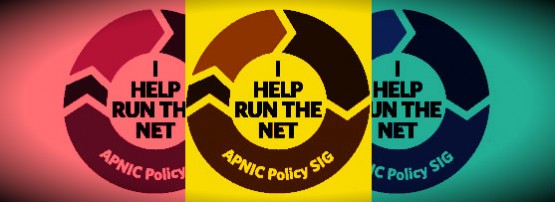
Three proposals to change IPv4 and transfer policies will headline discussions at the upcoming APNIC Policy Special Interest Group (SIG) meeting in Ho Chi Minh City, Viet Nam.
The APNIC Policy SIG meets twice a year to consider policy changes submitted by community members. These meetings are just one part of the decision-making process, and Internet stakeholders are encouraged to review the proposals and comment on the mailing list, indicating their support or otherwise for the proposals.
New subscriptions to the Policy SIG Mailing List are immediate and open to anybody with an interest in Internet resource management.
The SIG Chairs posted the following three proposals to the mailing list and asked for discussion at the end of January. Any consensus decisions made at the Viet Nam meeting will be posted back to the mailing list for Final Comments before being put before the APNIC Executive Council for endorsement and implementation.
The Proposals under discussion on the mailing list are:
prop-116: Prohibit transfer of IPv4 addresses in final /8 block
Version three of this proposal seeks to block the ability to transfer addresses delegated under the ‘Final /8’ policy. These blocks are from the 103/8 range and are intended to provide a small amount of address space to allow existing and new Members a final block to connect to the IPv6 Internet.
The proposal points to examples where 103/8 blocks appear to have been obtained for the sole purpose of transfer and tries to prevent this by stopping the transfer of all resources in this range.
Version two of this proposal was discussed at the last APNIC Conference in Sri Lanka. The main change from the version discussed at APNIC 42 is that it allows transfers of 103/8 blocks after a period of two years, instead of an outright ban on Final /8 block transfers. The policies for merger and acquisition transfers were also relaxed a little.
prop-117 – Returned IPv4 address management and final /8 exhaustion
This proposal aims to simplify address pool management and provides guidance for ‘Final /8’ pool exhaustion. It seeks to clarify the distinction between 103/8 and non-103 address space, and to which pool they are returned to. The proposal would stop ‘Final /8’ delegations after exhaustion and keeps the waiting list on the IPv4 Recovered Address Pool.
prop-118: No need policy in APNIC region
This proposal removes the requirement for demonstrated need for IPv4 transfers in the APNIC region. If an APNIC member is receiving a transfer from an RIR that requires demonstrated need, they must provide a plan for the use of at least 50% of the transferred resources within five years.
Revising eligible voters of Chair election and Chair’s term also to be discussed
The proposal to make changes to the operating procedures for all APNIC SIGs includes the following key elements:
- Suggestion for a mechanism to ensure Chair and Co-Chair terms end in alternate years.
- Clarifying the roles and responsibilities of Chairs and Co-Chairs.
- Allowing the election of a second Co-Chair by a consensus decision of the SIG members. Currently, the Chair holds this right exclusively.
This is a new version of a proposal originally discussed at APNIC 42. The earlier version dealt only with matters relating to the election of Chairs. While this version (under a new author) does not include some of the suggestions that seemed unlikely to reach consensus, it introduces some other ideas, such as the ability for SIG members to request a second Co-Chair position be filled. It also includes some new guidelines for the Chair’s handling of decisions made by the SIG.
For details about the APNIC 43 Policy SIG meeting, please visit the APNIC 43 policy page.
People who are unable to attend the meeting in Ho Chi Minh but wish to participate may use the remote participation facilities.
The views expressed by the authors of this blog are their own and do not necessarily reflect the views of APNIC. Please note a Code of Conduct applies to this blog.
